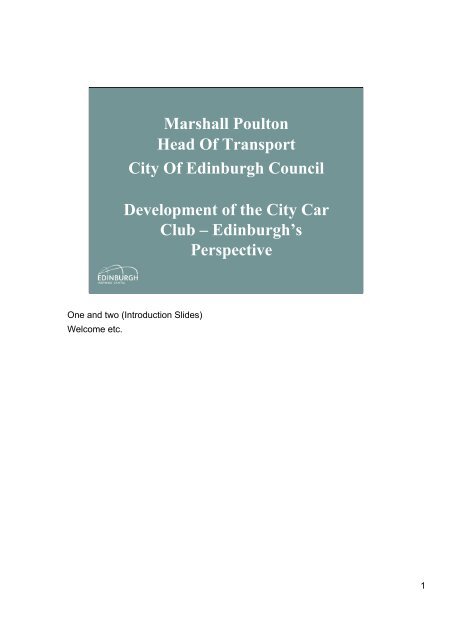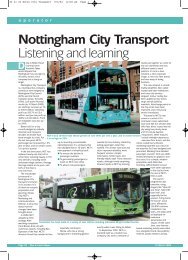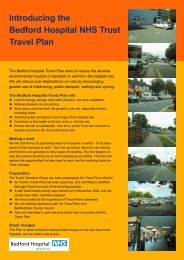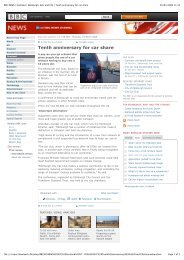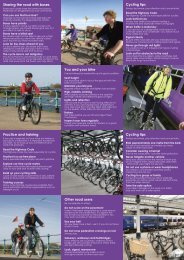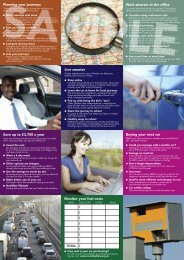5 Marshall Poulton - Richard Armitage Transport Consultancy Limited
5 Marshall Poulton - Richard Armitage Transport Consultancy Limited
5 Marshall Poulton - Richard Armitage Transport Consultancy Limited
Create successful ePaper yourself
Turn your PDF publications into a flip-book with our unique Google optimized e-Paper software.
<strong>Marshall</strong> <strong>Poulton</strong><br />
Head Of <strong>Transport</strong><br />
City Of Edinburgh Council<br />
Development of the City Car<br />
Club – Edinburgh’s<br />
Perspective<br />
One and two (Introduction Slides)<br />
Welcome etc.<br />
1
Edinburgh<br />
Edinburgh – As you can see from my slides Edinburgh is the inspiring capital<br />
city of Scotland, it is the Political and financial hub of the country and it is a<br />
cultural and historical landmark city renowned throughout the world.<br />
Being one of the drivers of transport innovation, particularly within Scotland,<br />
Edinburgh became the first scheme of its kind in the UK – based on European<br />
models already established in Switzerland and Germany.<br />
2
Bay Locations in 1998 (4)<br />
Three<br />
The Council has always had a commitment, within its Local <strong>Transport</strong> Strategy,<br />
to pursue means of encouraging cars to be used more efficiently, through<br />
measures such as parking management, management of the road network<br />
and promotion of City Car Club<br />
Until recently, non-car owners had limited access to the benefits of car<br />
ownership, and no opportunity to choose a car free environment. City Car Club,<br />
car sharing and Car Free Housing are starting to change this<br />
March 1999 – four sites with eight cars located within Marchmont area of the<br />
city – predominance of degrees, middle income, early 30s. Research from<br />
European cities indicated that this type of population was most likely to<br />
subscribe to service<br />
Original car club was operated by Budget (99-01) – number of factors affected<br />
economic viability of scheme and operator had to ‘walk’<br />
3
Four and five<br />
Smart Moves/City Car Club took over operation in 2001<br />
Operation needed to be kick started<br />
Council ‘walked the talk’ and supported City Car Club by block booking three<br />
vehicles within the city centre, currently nine, which gave City Car Club time to<br />
establish itself, ensured that vehicles would be used and therefore noticed by<br />
the wider public and provided the council with an economically advantageous,<br />
convenient alternative to fleet vehicles<br />
The Council also showed its commitment to the scheme by providing spaces<br />
for City Car Club and delivering all associated work, TRO, Lines+Signs etc<br />
free of charge<br />
4
Bay Locations in 2001 (15)<br />
Soon number of locations had expanded to 15 and locations such as<br />
Stockbridge and Tollcross were brought into the scheme<br />
The availability of City Car Club in two of Edinburgh’s traditional shopping<br />
areas encouraged further use, pleased retailers and was a further commitment<br />
to the Local <strong>Transport</strong> Strategy<br />
5
Intuitive IT Based System<br />
Six<br />
Identified early on that European model for booking and using vehicles was not<br />
as slick or as technology based as it could be<br />
Paper based systems with car keys placed in on street safes seemed too<br />
onerous<br />
Initially an infra red key was used, but this was unreliable<br />
When Smart Moves/City Car Club took over the scheme we moved to the<br />
current Smart Card operation with on line booking<br />
Easy for all users<br />
Book<br />
Once you join it takes just seconds to log in to our booking area and reserve<br />
your car. Or you can book over the phone for a small charge. You can even<br />
book directly from the car itself if the car is free.<br />
Jump in<br />
Hold your membership card over the card reader on the windscreen to unlock<br />
the car. Once you’re inside the car, tap your PIN into the on-board computer,<br />
and grab the keys<br />
Drive away<br />
It’s all yours; care-free driving, courtesy of City Car Club.<br />
6
2500<br />
2000<br />
1500<br />
1000<br />
500<br />
0<br />
City Car Club Membership 2004-2008<br />
2004 2005 2006 2007 2008<br />
Private<br />
CEC<br />
Total<br />
Seven<br />
To achieve a continuation of service Smart Moves and the Council planned to:-<br />
establish an active partnership ensuring the maximum potential of the scheme was<br />
realised<br />
introduced a new fleet of small and medium sized Vauxhall cars equipped with onboard<br />
communications device<br />
commissioned a call centre to operate telephone bookings and run a help desk<br />
introduced internet booking as an alternative to telephone booking<br />
established local marketing and support services in Edinburgh<br />
rebuilt member confidence in the reliability of the club.<br />
Figures clearly show that the partnership strategy worked and membership has steadily grown<br />
Membership grew at a particularly impressive rate between 2004 and 2008 – 273 to 2262<br />
Most impressive during this time was the growth in private members (from 152-1776) proving<br />
that the carefully considered location of new bays and marketing through various sources<br />
(buses, ‘On Route’ publicising LTS, leaflet distribution etc) was raising the profile of the<br />
scheme<br />
Also showed that the initial reliance on Council support through block booking and high<br />
membership, although still important, was no longer vital to continuing success of scheme<br />
7
100<br />
80<br />
60<br />
40<br />
20<br />
0<br />
No. of City Car Club Vehicles (Average) 2004-2009<br />
2004 2005 2006 2007 2008 2009<br />
No. of<br />
Cars<br />
(Average)<br />
Eight<br />
Increased marketing including attendance at Fringe Sunday, Car Free Day,<br />
Portobello Festival of Learning, and the consultations on the proposed<br />
extension of the Controlled Parking Zone and the success of existing and new<br />
Car Club locations obviously led to the need for more vehicles<br />
The council has assisted the Car Club by leasing nine vehicles at a<br />
economically advantageous rate<br />
Number of vehicles has quadrupled in four years<br />
Unprecedented growth<br />
8
Total Hours Used by all Users 2004-2008<br />
150000<br />
100000<br />
50000<br />
Hours<br />
Used<br />
0<br />
2004 2005 2006 2007 2008<br />
Nine<br />
When the scheme first started a number of factors combined to make the<br />
operation uneconomic for the operator. There was very little daytime business<br />
use, which, combined with the fact that the bulk of private use was at evenings<br />
or weekends produced an inefficient utilisation of the vehicles. Although the<br />
number of hires per member was generally in line with expectations, the<br />
number of members per car was less than a third of that experienced in<br />
successful car clubs in Europe resulting in a low utilisation rate per car.<br />
The initial choice of sites was not well matched to the eventual distribution of<br />
membership, particularly outwith the initial core areas of Marchmont and<br />
Sciennes and marketing by Budget was not as extensive as originally<br />
expected. All these factors combined to produce an operation which could not<br />
be sustained without substantial losses being incurred by the operator<br />
Marketing in partnership with the Council and a greater understanding of<br />
where bays/cars are needed has resulted in the number of hours used by all<br />
members almost tripling between 2004 and 2008 from 48K to 127K<br />
9
Bay Locations in 2009 (58)<br />
Ten<br />
Car club proving to be success after ten years of growth<br />
Club has grown considerably – now 82 cars in 59 locations citywide.<br />
The club has now grown into a ‘city’ car club with car stations from Granton<br />
and Portobello in the north to Morningside in the south and from Edinburgh<br />
Park in the west to Niddrie in the east also including site like IKEA<br />
Membership now over 2300 (450 of these are Council staff using the ‘pool car’<br />
arrangement)<br />
10
2500<br />
Breakdown of Members 2007/08<br />
2000<br />
1500<br />
Members<br />
October 2007<br />
New<br />
Members<br />
2008<br />
Total<br />
1000<br />
500<br />
0<br />
Private members CEC members Total Business Total<br />
Eleven and twelve<br />
By making much more efficient use of a pool of cars, a single vehicle can<br />
replace five to six privately owned cars, thus helping to reduce parking<br />
pressure. The primary aim is to inform travellers about the travel choices<br />
available and the impact of car use, supported by the provision of equipment<br />
and services that can make it as easy as possible for people to benefit from<br />
alternatives to car use where practical alternatives exist. The strategy supports<br />
the overall aims of the LTS to reduce congestion, and to reduce the adverse<br />
impacts of travel.<br />
“Smarter travel choices”<br />
Car sharing, city car club Measures to encourage car sharing, and to provide<br />
‘city car club’ facilities are both elements in the toolkit of measures available as<br />
alternatives to conventional single occupant car travel. As such they can be<br />
built into Travel Plans and be an available option in awareness and<br />
individualised travel planning initiatives<br />
It is extremely encouraging to see that Private Members and Business users<br />
have both increased their membership particularly in the last year<br />
11
% of Members by Type and Growth 2008<br />
80.00%<br />
70.00%<br />
60.00%<br />
50.00%<br />
40.00%<br />
% Total<br />
% Growth 2008<br />
30.00%<br />
20.00%<br />
10.00%<br />
0.00%<br />
Private members CEC members Total Business<br />
The fact that the business community has grown their membership by over<br />
100% between 2007/08 shows real buy in and support for policies which have<br />
encouraged a change in travel habits<br />
Information is key and the increase in membership in 2007/08 indicates the<br />
success of marketing and accessibility to information particularly through the<br />
internet<br />
Key objectives of Council’s LTS have been met:<br />
To improve awareness and understanding about alternatives to<br />
car use<br />
To ensure that basic facilities are in place in homes, schools,<br />
shopping areas and<br />
To support innovative measure to reduce travel demand or<br />
provide better alternatives to car use<br />
12
Working in Partnership<br />
Local <strong>Transport</strong> Strategy<br />
Parking Standards<br />
Single Outcome<br />
Agreement<br />
Block Booking<br />
Developers Contributions<br />
Lines and Signs<br />
Vehicle Leasing<br />
Traffic Regulation Orders<br />
Pump Priming<br />
Sustainable Travel Plan<br />
Thirteen<br />
The club is a good example of partnership between the Council and private sector – we do not<br />
pay the club to provide the service – we work with the club to promote the concept of pay-asyou-drive<br />
car sharing.<br />
We continue to support the club by providing on street parking places, by promoting the club in<br />
Council publications (Oracle, A-Z, Website), by encouraging developers to contribute<br />
financially and as corporate users.<br />
Many of the new car club sites have been part funded by developers through the planning<br />
process to ease parking pressures from new development.<br />
An increasing number of residents find that pay-as-you-go motoring is cheaper and more<br />
convenient than owning their own car and have joined the City Car Club. As a result, the<br />
Council actively supports this concept through the development control process. Experience<br />
from national and European car clubs shows that such facilities can help reduce the number of<br />
permanent parking spaces needed for a residential development. For new residential<br />
developments, the Council will require up to one parking space per 20 units to be provided for<br />
City Car Club vehicles, together with a financial contribution towards costs. Prospective<br />
residents should be made aware of the facility, especially where a Residential Travel Plan is a<br />
planning condition.<br />
Developer contributions since 2004 c. £400K<br />
Car club cars contribute to a reduction in car ownership thus contributing to potential reduction<br />
in pollution from road traffic<br />
Contributes to Council’s transport strategy to encourage sustainable car use – payment at the<br />
point of use relating the cost of the journey to the cost of alternative modes of transport.<br />
13
Coordination with Edinburgh Trams<br />
Tram Stop<br />
City Car Club Location<br />
Edinburgh Park Central Edinburgh Park<br />
Haymarket<br />
Magdala Crescent<br />
Orwell Place<br />
Newhaven<br />
Craighall Road<br />
Newhaven Road<br />
Pitt Street<br />
Ocean Terminal Cables Wynd<br />
Dock Street<br />
Madeira Street<br />
Port of Leith<br />
Casselbank Street<br />
Elbe Street<br />
Princes Street<br />
Castle Terrace<br />
Cockburn Street<br />
St Giles Street<br />
George Street<br />
Shandwick Place Drumsheugh Gardens<br />
Glenfinlas Street<br />
Grove Street<br />
Melville Street<br />
St Andrews Sq Canongate<br />
Dublin Street<br />
East Market Street<br />
Waterloo Place<br />
Fourteen<br />
According to a City Car Club Membership survey across all schemes (although<br />
Edinburgh members provided 40% of respondents):<br />
Three-quarters of City Car Club members use public transport at least once a<br />
week, 31% use public transport daily, and 15% report an increase in public<br />
transport use since joining City Car Club<br />
Vital that access to public transport is easy for City Car Club Users<br />
We have ensured that a number of City Car Club locations are near to existing<br />
public transport interchanges<br />
Clear that locations will also be located near to planned tram stops<br />
14
Interconnectivity<br />
Fifteen<br />
The City Car Club Membership survey also states that:<br />
City Car Club members are more likely to be multi-modal, selecting the most appropriate<br />
transport for the journey they are undertaking. City Car Club members walk, cycle and use<br />
public transport more frequently than the national average<br />
Envisage one multimodal ticketing service which will encourage interconnectivity<br />
This will be particularly important at key transport hubs such as Haymarket Station<br />
With proper marketing and buy in from technology and transport providers could even create a<br />
loyalty scheme not dissimilar to supermarkets<br />
Sum up<br />
The club is still the biggest car club in the UK outside London<br />
The club contributes to social inclusion by offering the opportunity for non car owners to<br />
access a car for those trips where public transport is unavailable<br />
City Car Club membership has reduced car dependency amongst its members and reduced<br />
the number of cars owned by a group with the highest potential for high car dependency.<br />
The club will continue to grow with support from its partner City Of Edinburgh Council<br />
15


